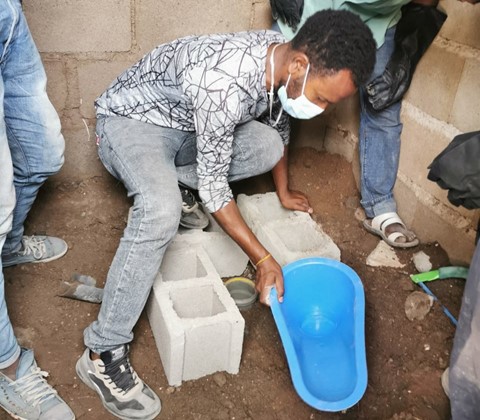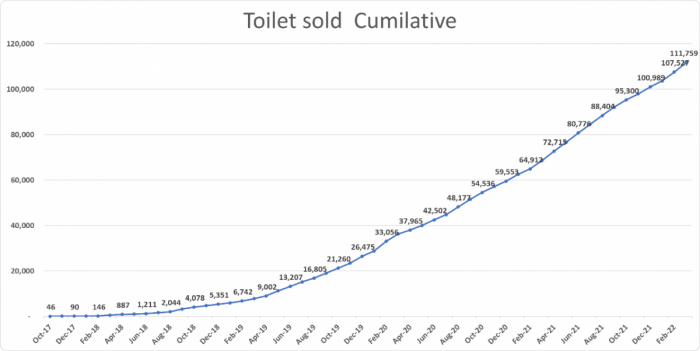Partnering with Ethiopia's private sector for market-based sanitation.
Published on: 12/05/2022
By Dagim Demirew, WASH Business Development Associate Director, PSI
Local small businesses in Ethiopia play a significant role in flushing away the country’s sanitation woes. The big win: these businesses recently hit a major milestone—selling their 100,000th toilet to a household in Ethiopia. Through two USAID-funded multi-year initiatives, Transform WASH and Feed the Future Growth through Nutrition, Population Services International (PSI) has been supporting these local businesses to introduce a broad range of affordable sanitation products and services to local markets.

Prior to the launch of the two projects—Transform WASH in 2017 and Feed the Future Growth through Nutrition (GTN) in 2016— the sanitation market serving rural and peri-urban communities barely existed. Previous ‘sanitation marketing’ projects focused only on selling expensive concrete slabs and largely relied on inexperienced businesses. The product and service offerings were not viable for businesses, were undesirable for many households, and lacked potential for scale.
The projects have operated in more than 80 woredas (districts) across 9 regions. Learning quickly that the old approach of focusing on concrete slab manufacturing resulted in low quality products and low sales, the team adapted by expanding delivery models to a range of products and services that suited various customer segments. The team recruited experienced entrepreneurs and business partners, selected based on their interest and capacity, and introduced lower-cost improved sanitation innovations, such as the SATO pan, which automatically seals to eliminate odours and flies.
With the introduction of SATO pans, small businesses and service providers, such as masons, became pivotal players in the supply chain. These actors offered simple upgrades and installation services for existing unimproved toilets. Transform WASH’s basic toilet upgrade model—the most popular among newly introduced models—entails masons conducting door-to-door sales of SATO pan installation services.

Reaching 100,000 toilets in sales was no easy feat. Besides early challenges with installation quality, the team had to overcome stakeholders’ scepticism about using market-based solutions for public health challenges as well as negative community expectations stemming from a history of projects providing free handouts. Transform WASH and GTN transcended these challenges by focusing on customer needs, flexible business models, and business profitability. WASH sector actors have embraced this success, and Ethiopia’s Ministry of Health and the cross-sectoral One WASH National Programme have incorporated the new approaches into the National Market-Based Sanitation Guideline.
Sales and access to basic sanitation services have also been heavily impacted by both national and global events, including the COVID-19 pandemic and internal conflict. While consistently growing over time, sales trends among project business partners have fluctuated—i.e., alternating rise and fall in sales—as depicted in the chart below.

During the first three years of market development activities, sales tripled every year, peaking in February 2020. This trend suggested sales would continue increasing until the onset of the rainy season in June. However, sales declined by 150%, from 4,276 in February to 1,700 in April 2020, due to the onset of the pandemic. The toilet market has just recently recovered from the effects of the pandemic.
To support market recovery, PSI-Ethiopia introduced the Decision Quotient (DQ) Sales® method, an approach developed by PSI’s partner, Whitten and Roy Partnership, that helps customers better identify their sanitation problems and the financial and social cost of those problems. Project staff were trained in this approach and in turn built the capacity of business partners, typically mason toilet installers, to use the DQ Sales® approach for executing effective door-to-door promotion and sales. Using this approach, nearly one out of every three households reached with the DQ approach purchased a product and installation service.
Following the introduction of the DQ Sales® approach, sales rose rapidly from June until November 2020, when the security situation in the Tigray and Benishangul Gumuz regions forced an end to toilet sales in those regions. The expansion of the conflict to the West Oromia and Amhara regions (North and South Wollo) in September 2021 also correlated with a decrease in sales in the following month.
100,000 toilets have given nearly half a million people access to basic sanitation. This is far from Ethiopia’s goal of achieving universal access, but reaching this milestone proves that, despite significant external challenges and shocks, that market-based sanitation efforts can create a resilient market in Ethiopia that will continue to accelerate toilet sales into the future.
---
USAID Transform WASH aims to improve water, sanitation and hygiene (WASH) outcomes in Ethiopia by increasing market access to and sustained use of a broader spectrum of affordable WASH products and services, with a substantial focus on sanitation. Transform WASH achieves this by transforming the market for low-cost quality WASH products and services: stimulating demand at the community level, strengthening supply chains, and improving the enabling environment for a vibrant private market.
USAID Transform WASH is a USAID-funded activity implemented by PSI in collaboration with SNV, Plan International, and IRC WASH. The consortium is working closely with government agencies, including the Ministry of Health, the Ministry of Water, Irrigation and Electricity, the One WASH National Programme, and regional and sub-regional governments.
USAID Feed the Future Ethiopia, Growth through Nutrition Activity was a five-year (2016-2021) multisector nutrition and Water, Sanitation, and Hygiene (WASH) project which aimed to improve the nutritional status of women and young children in Ethiopia. The project worked with the Ministries of Agriculture and Livestock; Health; Water, Irrigation, and Energy; and Education at all levels to strengthen institutional capacity and influence policy to improve nutrition. Save the Children led the implementation of the project in collaboration with six international and five local partners. PSI was one of the international partners.
Transform WASH partner logos:

At IRC we have strong opinions and we value honest and frank discussion, so you won't be surprised to hear that not all the opinions on this site represent our official policy.